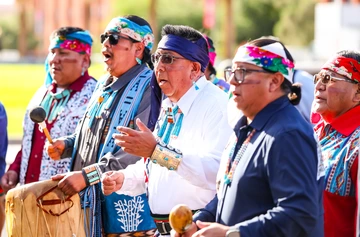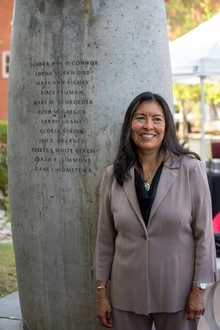Hopi Tribe and U of A celebrate 'warm relationship' with Hopi Recognition Football Game

The football game between Arizona and Weber State on Saturday served as the Hopi Recognition Football Game, celebrating the culture and sovereignty of the Hopi Tribe in northeastern Arizona. Hopi dancers performed the tribe's corn dance at pregame festivities and at halftime. The visit also allowed Hopi leaders to connect with Hopi U of A students and U of A leaders.
Marison Bilagody/Arizona Athletics
Most attendees to Saturday night's football game between Arizona and Weber State had grown restless by 7:30 p.m., when nearby lightning strikes had delayed the game by half an hour.
It would be another hour and a half before kickoff, and fans safely waited out the lightning inside the concourse of Arizona Stadium.
But in a green room on the stadium's field level, where the members of a delegation from the Hopi Tribe had gathered with their families, the energy was joyous. Hopi singers and dancers had just performed the tribe's corn dance before hundreds of tailgaters at the festivities before the game. The Hopi, whose culture emphasizes farming the arid mesas in northeastern Arizona, never lament a chance for rain, said Hopi Tribe Chairman Timothy Nuvangyaoma.

Hopi Tribe Chairman Timothy Nuvangyaoma (in white) and other Hopi singers perform at the tailgate ahead of Saturday's Arizona-Weber State game.
Mike Christy/Arizona Athletics
"Everything that Hopi does with our ceremonies and these types of dances, it really is all about prayer and bringing in the moisture," Nuvangyaoma said from the green room amid the delay. "Our hearts are filled right now. We're content, we're blessed, and it's a good feeling."
The delegation from Hopi was on campus as part of the University of Arizona's Hopi Recognition Football Game, a chance to honor the culture and sovereignty of one of Arizona's 22 federally recognized tribes during pregame festivities and halftime programming. The visit – which welcomed several generations of Hopi to campus, from young children to elders – also allowed tribal leaders to connect with Hopi U of A students and U of A leaders.
The game marked the university's third year honoring Arizona tribes with a home football game near the start of the season; the university has previously recognized the four O'odham tribes and the Pascua Yaqui Tribe. The university has more than 2,000 Native students in its student body, representing about 200 tribes.
"Our relationship with the University of Arizona is a warm relationship, and there's never a time that we didn't feel welcome on campus, and that's extended through not only the faculty and staff, but even the students," Nuvangyaoma said. The year of planning for the game, he added, "was a lot of work, just like any kind of planning is, but to see the actual reality of it come to play is extremely powerful for us."

From left: Hopi Tribe Vice Chairman Craig Andrews, Chairman Timothy Nuvangyaoma and Arizona head football coach Brent Brennan meet at the start of the Wildcat Walk to exchange gifts ahead of the Hopi Recognition Football Game.
Mike Christy/Arizona Athletics
The festivities began at the tailgate with a corn dance by tribal members, including Nuvangyaoma and other tribal leaders, at the intersection of Cherry Avenue and University Boulevard. The Arizona football team then arrived for the Wildcat Walk, the team's traditional walk down Cherry Avenue toward the stadium. Before the walk, Nuvangyaoma and Hopi Vice Chairman Craig Andrews presented head coach Brent Brennan with a Hopi singing vest, a contemporary vest with traditional Hopi designs that Hopi wear when they sing in ceremonies. Brennan, in exchange, presented Hopi leaders with a team-signed football.
Hopi dancers then performed again at the Bear Down Bash, which offers music, food trucks and other festivities ahead of the game at Bear Down Field.
After the weather delay and just before kickoff, a video played on the stadium's scoreboard featuring Stewart Koyiyumptewa, director of the Hopi Cultural Preservation Office, delivering the university's land acknowledgement in the Hopi language. The Hopi Veterans Color Guard then presented the flag during the National Anthem.
During television breaks in the first quarter, Hopi tribal leaders, military veterans and other tribal members were honored in the north end zone before in-person attendees.
"This game is an important way for tribes to share their culture and who they are with us," said Levi Esquerra, U of A senior advisor to the provost for Native American affairs whose team coordinates the annual tribal recognition game. "The biggest piece of my job is to increase education and awareness opportunities, and for me, this is a huge awareness opportunity."
A 'piece of home' on campus
The day before the game, the Hopi delegation gathered on campus at the Women's Plaza of Honor to celebrate the career of Diane Humetewa, a U.S. District Court judge in Arizona. Humetewa, who is Hopi, is the first Native American woman and first enrolled tribal member to serve as a federal judge.

The day before the game, the Hopi delegation gathered on campus at the Women's Plaza of Honor to celebrate the career of Diane Humetewa, the first Native American woman and first enrolled tribal member to serve as a federal judge.
Kyle Mittan/University Communications
Humetewa's name is now the latest engraved into a pillar at the Women's Plaza of Honor, where it sits next to several other prominent female legal figures from Arizona.
Humetewa and Nuvangyaoma later gave talks at the James E. Rogers College of Law and the Campus Store on Friday before meeting with students over lunch. Attendees included Brianna Medrano, a senior studying business management in the Eller College of Management.
Medrano, who is Hopi and the president of the U of A's student chapter of American Indigenous Business Leaders, said she appreciated the opportunity to meet with Humetewa and other tribal leaders.
"It's been a really good experience, and it's really meaningful because it shows that they care," Medrano said, adding that tribal leaders she spoke with encouraged her to pursue graduate school. "They just want the younger generation of Hopi people and students to just learn as much as they can so that we're able to go back home and establish ourselves there and help the community."
Delayna Scott, a senior studying applied humanities in the College of Humanities who is half Hopi and half Navajo, also attended Friday's talks and lunch. Getting to meet Nuvangyaoma, Humetewa and other Hopi leaders was an inspiring reminder to work hard "because you never know where it can get you," Scott said.
"I think anyone who was at that event that day as a student felt like they belonged here and felt like they were proud to be Hopi," she added. "Just having events like this where you can bring a little piece of home back into school is so important, and I think it's really important for youth to know who their leaders are, what they're doing and how they're doing it."
The Hopi delegation's visit culminated at halftime on Saturday night, when performers took center field for a final corn dance. Six men, including Nuvangyaoma and other tribal leaders, sang prayers in Hopi and kept time with drums and gourd rattles. Nine dancers, mostly children, moved to the rhythm.
There was no significant rain over the stadium on Saturday, but the clouds remained, and the air cooled from a persistent breeze.
The Arizona Wildcats won the game 48-3.





